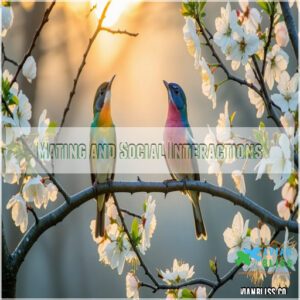This site is supported by our readers. We may earn a commission, at no cost to you, if you purchase through links.

Cooler evening air carries their songs farther, making it the perfect time to broadcast their melodies. Males often use these songs to mark territory or impress potential mates with their vocal flair.
As light fades, predator activity declines, giving birds a bit of safe space for their performances. It’s also quieter in the evening, especially in noisy urban areas, so their calls don’t get drowned out.
Some young birds even practice their tunes at night, perfecting their skills. Curious about these winged serenades? There’s more to discover about the evening songs of birds.
Table Of Contents
- Key Takeaways
- Birds Evening Singing
- Why Birds Sing Evening
- Environmental Factors Influence
- Bird Communication Methods
- Mating and Social Interactions
- Nocturnal Adaptations and Safety
- Light and Noise Pollution Effects
- Bird Singing Behavior Variations
- Frequently Asked Questions (FAQs)
- Why are birds singing in the evening?
- Why do birds sing at dawn and dusk?
- Why do birds get so loud at sunset?
- What kind of bird sings at dusk?
- Why do birds sing at night?
- What birds sing at night?
- Why do mockingbirds sing at night?
- Why do birds come out at night?
- When do birds start singing?
- Why do birds sing at dusk?
- Conclusion
Key Takeaways
- Birds sing in the evening to mark territory, attract mates, and maintain flock bonds while taking advantage of quieter, safer conditions.
- Cooler, denser air at dusk allows their songs to carry farther, enhancing communication effectiveness.
- Reduced predator activity and lower noise levels during twilight make it a prime time for vocal displays.
- Some birds practice songs or adjust vocalizations to overcome challenges like urban noise and artificial light.
Birds Evening Singing
You’ll notice birds become more vocal during sunset as they take advantage of the ideal sound-carrying conditions created by cooler, denser air.
When the evening light fades, you can hear their songs travel further through the calm air, while the reduced predator activity during this time allows them to communicate more safely.
The combination of these factors results in birds being able to take full advantage of the evening to express themselves vocally.
Transition Periods Optimize Sound
Have you ever noticed how evening bird songs seem clearer during sunset?
As day shifts to dusk, changes in temperature and humidity create perfect conditions for sound transmission.
These twilight hours optimize acoustic ecology, making it easier for birds to communicate across distances.
Birds use various communication methods including vocalizations and visual displays.
Dawn choruses and evening chorus birds take advantage of these ideal conditions, as the atmosphere’s stability enhances their vocal learning and auditory adaptation capabilities, allowing for clearer evening bird songs.
Low Light Allows Songs to Travel
Many birds take advantage of low light conditions during dusk when sound transmission is prime, creating nature’s twilight orchestra. Evening songs travel farther through the cooler, denser air.
Some species sing at night due to various biological rhythms.
Here’s how birdsong at dusk benefits from these conditions:
- Sound waves travel up to 20 times farther
- Less wind interference disrupts vocal range
- Reduced background noise improves clarity
- Temperature inversions carry sounds horizontally
- Acoustic ecology enhances territorial calls, making the most of the low light conditions and sound transmission prime.
Reduced Predator Activity
While sound travels better in the evening air, there’s another clever reason for twilight birdsong: predator avoidance.
As daylight fades, most hawks and falcons have already settled in for the night, creating a safer window for smaller birds to vocalize.
You’ll notice crepuscular species taking advantage of this nocturnal safety, using their songs to communicate while visual hunters rest. It’s nature’s version of perfect timing.
Why Birds Sing Evening
Birds’ evening chorus creates a mesmerizing symphony as the sun dips below the horizon.
You’ll notice these twilight birdsongs serve multiple purposes in their complex social world.
When birds sing evening melodies, they’re often re-establishing territory boundaries after a day of foraging.
These sunset songs help maintain social bonds within flocks and guide members to safe roosting spots.
Vocal learning plays an important role as younger birds practice their nighttime harmony alongside experienced singers.
During dusk, the atmosphere becomes ideal for sound travel, making it the perfect time for birds to communicate across distances.
You’ll hear different species taking turns, creating a coordinated evening performance that serves both practical and social purposes.
This birdsong at dusk isn’t just beautiful – it’s essential for survival, helping birds locate their families and secure their territories before nightfall, which is crucial for their social bonds and territory boundaries.
Environmental Factors Influence
You’ll notice that birds change their evening songs based on weather conditions, with cooler temperatures and calm winds helping their calls travel farther through the air.
When there’s heavy rain or city noise, you’ll hear fewer birds singing since these conditions make it harder for them to communicate effectively with each other, especially in terms of distance.
Temperature and Wind Affect Song
The incredible journey of sound waves through evening air reveals nature’s perfect timing for birdsong at dusk.
You’ll notice how atmospheric conditions play an important role – cooler temperatures help sounds travel further while creating stable air pressure patterns.
Wind speed substantially impacts how far these evening bird sounds carry, with gentle breezes allowing songs to reach their intended audience.
Temperature effects can actually boost sound transmission, making dusk an ideal time for communication, and taking advantage of the atmospheric conditions.
Rainfall Suppresses Singing Activity
Just as temperatures shape bird melodies, rainfall impacts their evening chorus dramatically.
You’ll notice your feathered neighbors go remarkably quiet when storms roll in.
Here’s why weather impacts their sound dampening behavior:
- Raindrops create background noise that drowns out bird vocalizations
- Storm influence makes it harder for birds to detect predators
- Heavy rainfall affects birds’ ability to maintain body temperature
This bird silence during precipitation helps conserve energy until conditions improve, and it’s a result of the storm influence and the need to maintain body temperature, making it a crucial aspect of their survival strategy, especially in harsh weather conditions, with heavy rainfall being a key factor.
Urban Noise Pollution Masks Songs
While rainfall quiets the symphony of nature, a different challenge emerges in cities.
You’ll notice urban noise pollution creating a constant battle between bird songs and city sounds.
| Urban Sound Source | Impact on Bird Communication |
|---|---|
| Traffic Noise | Masks low-frequency calls |
| Construction | Disrupts mating signals |
| Air Traffic | Forces higher pitch songs |
| Industrial Sounds | Reduces territory defense |
| Emergency Sirens | Interferes with alarm calls |
Modern sonic ecology research shows birds adapting their songs, shifting to higher frequencies or singing during quieter evening hours when sound waves travel better through urban landscapes.
It’s a remarkable display of nature’s resilience in our changing bird habitats, where birds are forced to adapt to urban noise pollution, and find ways to overcome the challenges of city sounds, ultimately showcasing their ability to thrive in changing environments with higher pitch songs.
Bird Communication Methods
You’ll discover that birds use their evening songs as a complex communication system to establish territories and attract potential mates.
When you listen closely to these sunset serenades, you’re hearing males broadcasting their fitness to females while warning rival birds to stay away from their chosen areas, which is a key aspect of their complex communication system.
Singing Establishes and Defends Territories
Just as nature’s rhythms change from day to twilight, you’ll hear territorial defense in action through bird songs.
Each evening’s concert isn’t just a random melody – it’s a strategic Border Patrol marking vocal boundaries.
Song variation plays a key role in establishing dominance during these twilight bird calls.
- Think of it as a feathered version of "keep off my lawn," but with prettier melodies
- Males use defensive singing to warn potential intruders about crossing territory lines
- The more complex the song pattern, the stronger the territorial message becomes
Vocalizations Signal Territory Ownership
As the sun dips below the horizon, birds use vocalizations to mark territory and assert ownership.
These "bird boundaries" protect resources like food and nesting sites.
Through their songs, they broadcast vocal claims to rivals, reinforcing territorial defense without physical confrontations.
This birdsong meaning maintains clear communication, helping avoid disputes.
Border defense through song is an efficient, non-violent survival tool, and it plays a crucial role in maintaining clear communication.
Songs Attract Potential Mates
As birds establish territories, their evening songs also play a role in mate attraction.
These vocal courtship displays showcase song quality, signaling fitness to nearby females.
Female choice hinges on birdsong meaning—complex, precise melodies often indicate stronger genetics.
This form of bird communication boosts breeding success, as males with superior songs secure mates effectively.
Blending courtship displays with territorial defense strategies is crucial, as it allows males to secure mates while defending their territory.
This strategy is essential for the birds’ survival and reproduction, making their evening songs a vital part of their behavior.
Mating and Social Interactions
When birds sing in the evening, they’re not just making noise—they’re sending important signals to potential mates and rivals.
Their songs showcase strength, fitness, and territorial claims, helping them attract partners and ward off competitors, which is a key aspect of their fitness.
Song Complexity Indicates Male Fitness
In discussing bird courtship, song complexity speaks volumes about a male’s fitness.
Vocal complexity in bird vocalizations works like a fitness signal, attracting females. These intricate mating calls highlight a male’s ability to gather resources and defend territory.
Here’s what makes them compelling:
- Demonstrates survival skills
- Reflects health and strength
- Highlights intelligence
- Edges out competitors
- Increases mate attraction
Females Assess Males Based on Song Quality
A male bird’s courtship songs serve as a musical audition for female selection.
By listening to vocal cues, females assess mate choice based on pitch, complexity, and endurance.
Birds communicate their fitness with elaborate melodies, as song preferences reveal genetic quality.
Bird vocalizations are critical in mating decisions, showing how song learning shapes survival through the art of bird song.
Evening Singing Claims Territory
After impressing females, males switch gears.
Evening chirps aren’t just romantic—they’re territorial alarms.
Sunset serenades boldly outline vocal boundaries, warning rivals, “This space is mine!”
Birds sing at night to secure dusk bird sounds that echo far, marking their territory effectively.
Vocal boundaries are nature’s way of confrontation without conflict.
- Sunset serenades deter intruders.
- Territorial boundaries maintain safety.
- Vocal battles intimidate rivals.
- Evening chirps reinforce dominance.
Nocturnal Adaptations and Safety
You’ll notice birds singing in the evening not just for beauty but for safety—they warn others of predators lurking nearby.
These vocalizations also help birds gather together for communal roosting, where there’s safety in numbers.
Birds Sing to Warn of Predators
Warning calls in the evening act as a predator alert, helping flocks stay safe when visibility drops.
These bird calls showcase survival tactics, signaling threats to maintain flock safety.
Nighttime singing, especially by nocturnal birds, reduces predator risks while reinforcing territory defense.
By fine-tuning threat signals, birds protect their groups, proving even in the quiet evening, safety comes first.
Communal Roosting Offers Safety
As night falls, birds rely on communal roosting for safety, gathering in flocks to reduce predator risks.
This behavior, known as "finding safety in numbers," promotes social bonding and nighttime congregation.
Crepuscular species often use bird calls during the evening to signal secure roosting spots.
- Flock Safety: Strengthens group protection.
- Roosting Behavior: Helps deter predators.
- Social Bonding: Builds group cohesion.
Alarm Calls Signal Danger
Alarm calls in the evening act as survival tactics for birds.
These sharp, distinct sounds serve as predator warnings, alerting flocks to potential threats.
Birds use various communication calls for different purposes.
Danger signals like these help maintain territorial boundaries and initiate a swift threat response.
Birds rely on these warning signals to keep predators at bay, ensuring safety during vulnerable hours, when visibility and safety are lowest.
Light and Noise Pollution Effects
You’ve probably noticed birds singing late into the evening, and artificial light is a big reason why.
Streetlights and other bright sources can trick birds into thinking it’s dawn, while constant urban noise forces them to sing at quieter times to be heard, due to the need to be heard.
Artificial Light Triggers Early Singing
Artificial lighting from urbanization confuses birds’ circadian rhythms, tricking them into singing earlier than usual.
Consider dark sky compliant lighting to mitigate this.
This disruption often leads to nocturnal birdsong, as species adjust to artificial evening light.
Dawn choruses may start too soon, throwing natural cycles out of sync.
Urban lighting also amplifies bird singing at night, especially in cities, where light pollution alters traditional behavior patterns, leading to a disruption of the natural dawn choruses.
Continuous Light Leads to Out-of-sync Singing
Evening birds singing nighttime songs can turn chaotic due to continuous light disrupting their circadian rhythm.
Birds use songs for various purposes, including mate attraction and territorial defense.
This light pollution leads to song disruption and a nocturnal shift in vocal synchronization.
Here’s how artificial light impacts birds:
- Distorts natural day-night cycles.
- Causes nocturnal birds’ songs at unusual times.
- Alters mating calls.
- Confuses territorial signals.
- Reduces effective communication.
The impact of artificial light on birds is significant, affecting their ability to communicate effectively, leading to a nocturnal shift in their behavior.
Daytime Noise Drowns Out Bird Calls
During the day, noise pollution disrupts bird calls, making it harder for their sound waves to travel.
Ambient noise from urban areas masks their songs.
Products for noise reduction and birds can help mitigate these effects.
As evening falls, environmental conditions improve, restoring audio clarity.
Birds, with exceptional hearing, take advantage of the quieter hours to communicate.
| Factor | Impact on Bird Calls | Time Frame | Result | Example |
|---|---|---|---|---|
| Noise Pollution | Masks songs | Daytime | Reduced Communication | Urban areas, traffic |
| Bird Hearing | Highly sensitive | Evening | Clearer audio recognition | Detect distant calls |
| Sound Waves | Travel further | Evening | Enhanced signal clarity | Stronger territory claims |
| Audio Clarity | Improves | Nighttime | Effective communication | Flock coordination |
| Ambient Noise | Noticeably lower | Evening | More distinct vocalization | Roosting signals clearer |
Bird Singing Behavior Variations
You’ve probably noticed that birds don’t all follow the same singing schedule, and some surprising factors influence their evening behavior.
From baby birds chirping for food to young ones practicing their songs at night or reacting to the light of a full moon, these variations reveal how adaptable and fascinating bird communication can be, showing how fascinating bird behavior is in different contexts.
Baby Birds Chirp for Attention
Sometimes, baby birds steal the show.
Their chirp patterns, known as nest calls, serve as fledgling voices asking for food or warmth.
Chick communication is precise—constant chirps prompt parental responses, ensuring survival.
You’ll notice birds sing at night for many reasons, but these baby bird sounds in the evening remind us how essential bird sounds are for connection and care.
Young Birds Practice Singing at Night
Singing practice plays a critical role in young birds’ development.
During the evening, these night songs help refine vocal learning as they mimic adult bird calls.
This youth chirping strengthens brain development, preparing them for future mating or territory defense.
Night birds singing provides a quiet, safe space for song learning, where mistakes are unnoticed, fostering confidence.
The process of vocal learning is influenced by factors related to bird vocalization changes, which affects their overall development.
Full Moon Influence on Singing Behavior
Under a full moon, brighter nights influence birdsong.
Some species sing more, taking advantage of the light to broadcast calls when predators struggle to hunt.
The lunar cycle, with its shifting moon phases, often impacts night singing.
Evening birds, like nightjars, and others use this extra illumination to communicate, attract mates, or defend territories.
Making bird sounds in the evening unforgettable, the combination of these factors creates a unique auditory experience under the lunar cycle.
Frequently Asked Questions (FAQs)
Why are birds singing in the evening?
Birds sing in the evening to claim territories, attract mates, and maintain social bonds.
Lower noise levels improve sound travel, and dim light offers safety from predators while making their songs more effective for communication.
Why do birds sing at dawn and dusk?
It’s like nature’s symphony tuning up!
Birds sing at dawn and dusk because cooler, quieter air carries their songs farther, helping them defend territories, attract mates, and reconnect with their flocks as day shifts.
Why do birds get so loud at sunset?
At sunset, lower light and quieter surroundings amplify sound, making communication more effective.
Birds mark territory, attract mates, and reconnect with their flock.
It’s like nature’s way of saving important calls for the quiet hours.
What kind of bird sings at dusk?
At dusk, species like robins, thrushes, and nightingales often sing.
Their songs establish territory, attract mates, and help locate roosts.
These twilight serenades carry farther due to reduced noise, creating a peaceful yet purposeful chorus.
Why do birds sing at night?
Around 30% of migratory birds sing at night to claim territory, attract mates, or navigate.
Low light reduces predator activity, making it safer.
Some species, like nightingales, use nighttime silence for their songs to stand out.
What birds sing at night?
You’ll often hear nightingales, mockingbirds, and owls singing under the moonlight.
Certain species, like thrushes and robins, also sing at night, especially in urban areas where artificial lights and quieter surroundings encourage their melodies.
Why do mockingbirds sing at night?
Mockingbirds sing at night to defend their territory, attract mates, and demonstrate their fitness.
Their complex, mimic-rich songs can deter rivals and capture attention when quiet surroundings make their vocalizations stand out most effectively, showcasing their ability to produce mimic-rich songs.
Why do birds come out at night?
It’s fascinating, but some birds come out at night to avoid predators, find mates, or defend territories.
Quiet evenings make their calls travel farther, while others like owls use darkness to hunt and communicate.
When do birds start singing?
Birds start singing just before dawn, during the "dawn chorus".
This is when light is low, and sound travels farther.
Hormones, like testosterone, spike early, driving their vocal displays for claiming territory or attracting mates.
Why do birds sing at dusk?
At dusk, birds sing to mark territory, attract mates, and communicate with their flock.
Lower noise levels and better sound travel during twilight make it the perfect time for important calls before settling in for the night.
Conclusion
As the sun dips below the horizon, birds sing in the evening like nature’s poets, blending survival with melody.
Their songs travel farther in cooler air, with less noise and fewer predators around.
These tunes claim territory, attract mates, and even serve as nighttime practice for younger birds.
Evening singing also adapts to environmental challenges, like urban noise or artificial light.
So next time you hear their serenade, know it’s part of a fascinating survival strategy that helps them survive!
- https://johnstonandjeff.co.uk/natures-symphony-why-birds-sing-and-what-it-means/
- https://www.birdtipper.com/why-do-birds-sing-at-night/
- https://plantura.garden/uk/garden-birds/facts/why-do-birds-sing
- https://www.reddit.com/r/Ornithology/comments/12dcmh0/why_do_some_dinural_birds_sing_at_night/
- https://www.ncbi.nlm.nih.gov/pmc/articles/PMC3309970/












